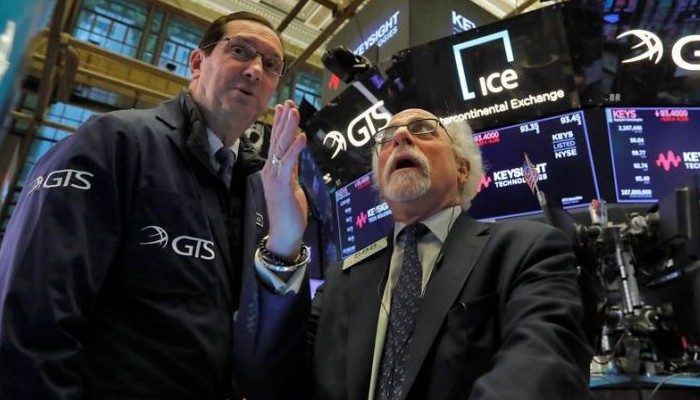TRENDING TAGS :
World stocks mixed after Wall Street sinks despite rate cut
Global stock markets were mixed Wednesday after Wall Street sank despite an emergency US interest cut aimed at defusing fears the virus outbreak might stunt global economic activity.
Beijing: Global stock markets were mixed Wednesday after Wall Street sank despite an emergency US interest cut aimed at defusing fears the virus outbreak might stunt global economic activity.
London opened lower while Germany advanced. Shanghai gained, Sydney and Hong Kong declined and Tokyo was little-changed.
Seoul's benchmark surged 2.2 per cent after the government announced a spending package to pay for medical supplies and aid to businesses hurt by the virus.
Markets appeared to be unimpressed by a pledge Tuesday from the Group of Seven major industrialised countries to support the global economy that included no specific measures.
On Wall Street, the benchmark S&P 500 index tumbled 2.8 per cent despite the Federal Reserve's surprise 0.5 per cent rate cut. It was the index's eighth daily decline in nine days.
China, Australia and other central banks also have cut rates to shore up economic growth in the face of anti-virus controls that are disrupting trade and manufacturing.
But economists warn that while cheaper credit might encourage consumers, rate cuts cannot reopen factories that have closed due to quarantines or lack of raw materials.
"Despite the Fed cutting rates in support of the US market, fear had clearly returned to reign in the markets," Jingyi Pan of IG said in a report.
More reductions may give "limited support," Pan wrote.
"Perhaps besides vaccines, there may be little quick and easy solution to easing the shock for global markets."
In early trading, London's FTSE 100 lost 0.3 per cent to 6,700.71 while Germany's DAX added 0.2 per cent to 12,010.94. France's CAC 40 shed 0.2 per cent to 5,359.75.
On Wall Street, the S&P 500 future rose 1.5 per cent and that for the Dow Jones Industrial Average was up 1.6 per cent.
On Tuesday, the Dow sank 2.9% and the Nasdaq composite fell 3 per cent.
US markets have fallen 11 per cent since setting a record two weeks ago.
On Wednesday in Asia, the Shanghai Composite Index gained 0.6 per cent to 3,011.67 while the Nikkei 225 in Tokyo added 0.1 per cent to 21,100.06. Hong Kong's Hang Seng shed 0.2 per cent to 26,222.07.
The Kospi in Seoul rose to 2,059.33 after the government announced a USD 9.8 billion spending package to pay for medical supplies and aid to businesses that are struggling with disruptions to travel, auto manufacturing and other industries.
Despite the extra spending, the virus "poses a major downside risk" to Korean economic growth, Rajiv Biswas of IHS Markit said in a report.
Market benchmarks in Singapore and the Philippines declined while New Zealand, Indonesia and Malaysia rose.
In another sign of US investor caution, the yield on the 10-year Treasury sank below 1 per cent for the first time in history.
It was at 0.95 per cent early Wednesday.
A smaller yield the difference between the market price and what investors receive if they hold the bond to maturity indicates traders are shifting money into bonds as a safe haven out of concern about the economic outlook.
Federal Reserve Chairman Jerome Powell acknowledged the ultimate solution to the virus challenge will have to come from health experts and others, not central banks.
The Fed has a long history of coming to the market's rescue with lower rates and other stimulus, which has helped this bull market in US stocks become the longest on record.
On Monday, the Dow recorded its biggest daily gain in more than a decade on rising anticipation for coordinated support from the Fed and other central banks.
Even before Tuesday's announcement, traders were convinced he Fed would cut rates by half a percentage point on March 18 at its next meeting.
The US rate cut was the Fed's first outside a regularly scheduled meeting since the 2008 global crisis.
That prompted some traders to think the Fed might foresee an even bigger economic impact than markets fear.
Benchmark U.S. crude gained 8 cents to USD 47.26 per barrel in electronic trading on the New York Mercantile Exchange.
The contract rose 43 cents on Tuesday to close at USD 47.18.
Brent crude, used to price international oils, added 1 cent to USD 51.87 per barrel in London. It fell 4 cents the previous session to close at USD 51.86 a barrel.
The dollar gained to 107.44 yen from Tuesday's 107.12 yen. The euro was flat at USD 1.1171.
INPUTS: PTI



